Impact of Lockdown on Children's Social Emotional Learning
VerifiedAdded on 2023/06/09
|8
|2331
|235
Report
AI Summary
This report investigates the impact of the COVID-19 lockdown on the social and emotional learning (SEL) of school-age children in Scotland. The research aims to understand how the pandemic and related restrictions affected children's SEL, focusing on the use of qualitative research methods including interviews with six social workers. The study employs an inductive approach and interpretivism philosophy to analyze data, with thematic analysis used to identify key findings. Ethical considerations and limitations, such as time constraints, are also addressed. The researcher reflects on their learning experience, highlighting challenges faced and the importance of support and accessibility in the research process. The report provides insights into the impact of the pandemic on children's behavior and emotions, offering valuable information for future research and interventions related to children's mental health and well-being during crises. The report also includes an introduction, research methodology, reflection, and references.
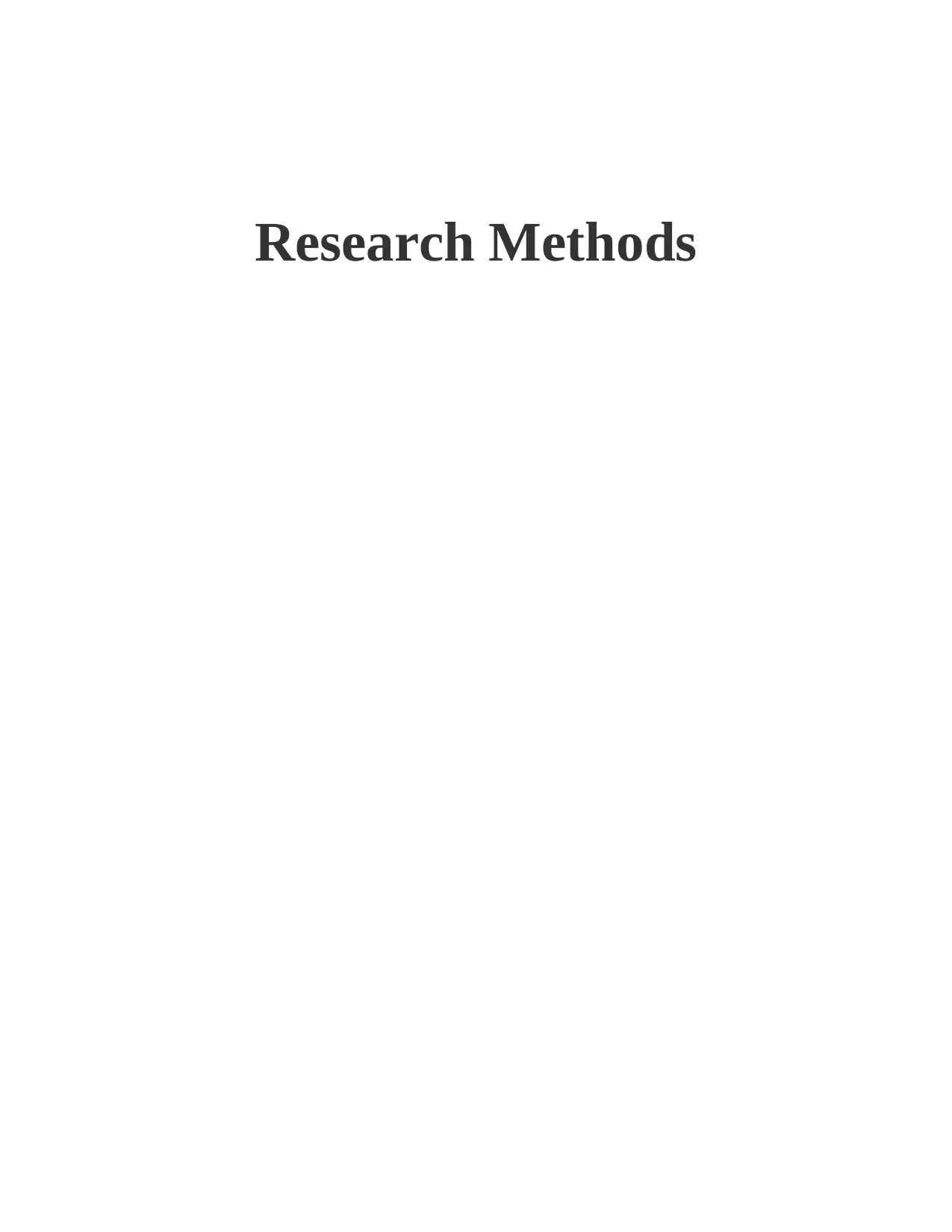
Research Methods
Paraphrase This Document
Need a fresh take? Get an instant paraphrase of this document with our AI Paraphraser
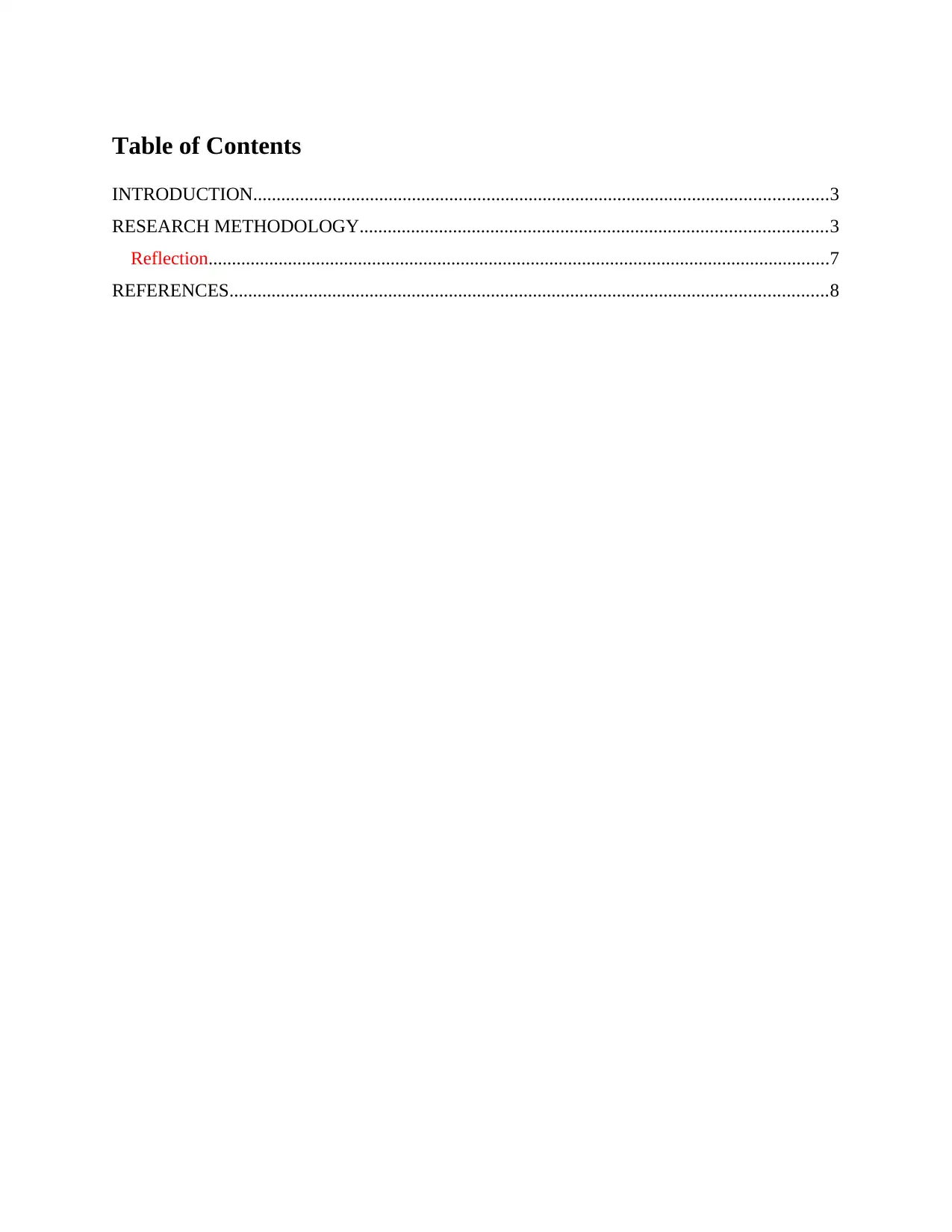
Table of Contents
INTRODUCTION...........................................................................................................................3
RESEARCH METHODOLOGY....................................................................................................3
Reflection.....................................................................................................................................7
REFERENCES................................................................................................................................8
INTRODUCTION...........................................................................................................................3
RESEARCH METHODOLOGY....................................................................................................3
Reflection.....................................................................................................................................7
REFERENCES................................................................................................................................8
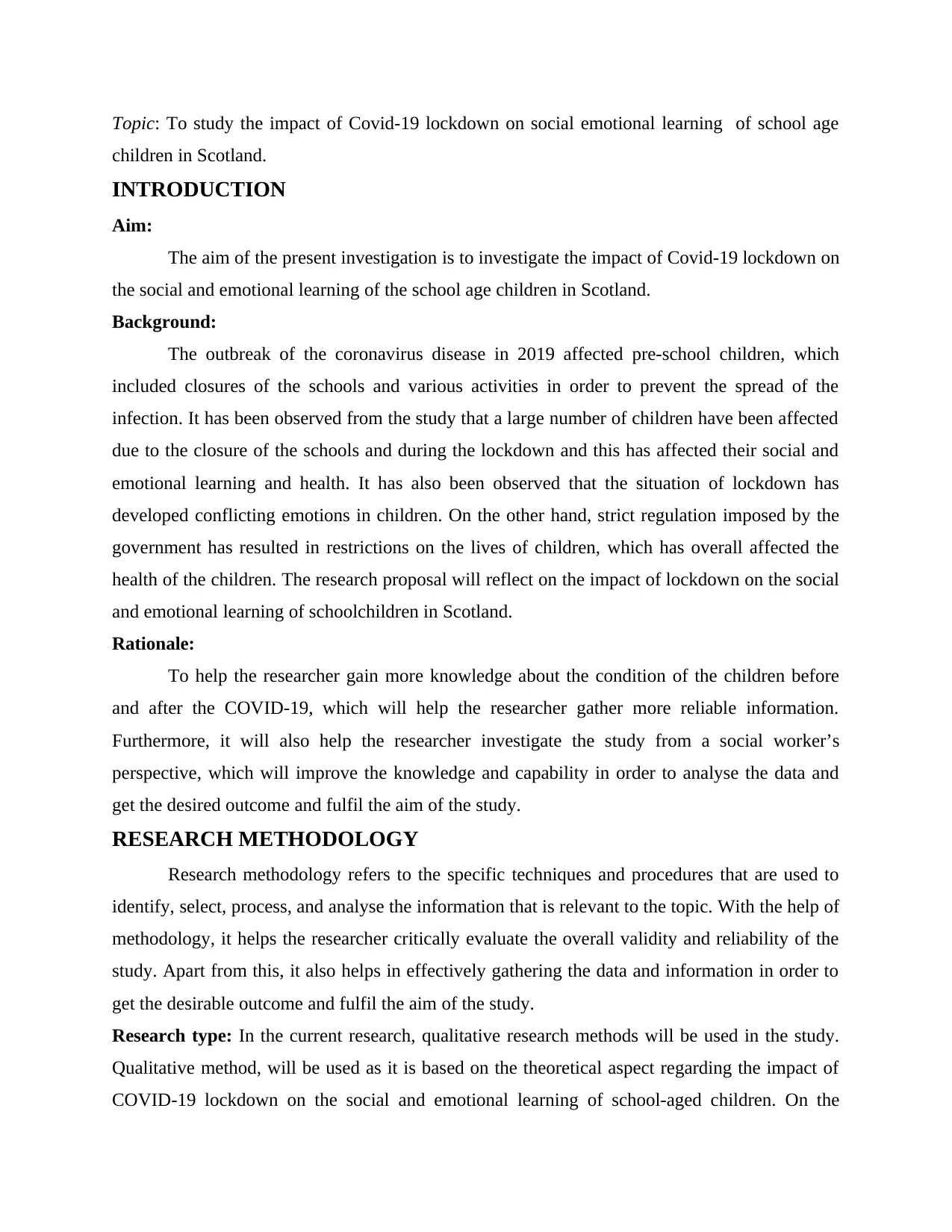
Topic: To study the impact of Covid-19 lockdown on social emotional learning of school age
children in Scotland.
INTRODUCTION
Aim:
The aim of the present investigation is to investigate the impact of Covid-19 lockdown on
the social and emotional learning of the school age children in Scotland.
Background:
The outbreak of the coronavirus disease in 2019 affected pre-school children, which
included closures of the schools and various activities in order to prevent the spread of the
infection. It has been observed from the study that a large number of children have been affected
due to the closure of the schools and during the lockdown and this has affected their social and
emotional learning and health. It has also been observed that the situation of lockdown has
developed conflicting emotions in children. On the other hand, strict regulation imposed by the
government has resulted in restrictions on the lives of children, which has overall affected the
health of the children. The research proposal will reflect on the impact of lockdown on the social
and emotional learning of schoolchildren in Scotland.
Rationale:
To help the researcher gain more knowledge about the condition of the children before
and after the COVID-19, which will help the researcher gather more reliable information.
Furthermore, it will also help the researcher investigate the study from a social worker’s
perspective, which will improve the knowledge and capability in order to analyse the data and
get the desired outcome and fulfil the aim of the study.
RESEARCH METHODOLOGY
Research methodology refers to the specific techniques and procedures that are used to
identify, select, process, and analyse the information that is relevant to the topic. With the help of
methodology, it helps the researcher critically evaluate the overall validity and reliability of the
study. Apart from this, it also helps in effectively gathering the data and information in order to
get the desirable outcome and fulfil the aim of the study.
Research type: In the current research, qualitative research methods will be used in the study.
Qualitative method, will be used as it is based on the theoretical aspect regarding the impact of
COVID-19 lockdown on the social and emotional learning of school-aged children. On the
children in Scotland.
INTRODUCTION
Aim:
The aim of the present investigation is to investigate the impact of Covid-19 lockdown on
the social and emotional learning of the school age children in Scotland.
Background:
The outbreak of the coronavirus disease in 2019 affected pre-school children, which
included closures of the schools and various activities in order to prevent the spread of the
infection. It has been observed from the study that a large number of children have been affected
due to the closure of the schools and during the lockdown and this has affected their social and
emotional learning and health. It has also been observed that the situation of lockdown has
developed conflicting emotions in children. On the other hand, strict regulation imposed by the
government has resulted in restrictions on the lives of children, which has overall affected the
health of the children. The research proposal will reflect on the impact of lockdown on the social
and emotional learning of schoolchildren in Scotland.
Rationale:
To help the researcher gain more knowledge about the condition of the children before
and after the COVID-19, which will help the researcher gather more reliable information.
Furthermore, it will also help the researcher investigate the study from a social worker’s
perspective, which will improve the knowledge and capability in order to analyse the data and
get the desired outcome and fulfil the aim of the study.
RESEARCH METHODOLOGY
Research methodology refers to the specific techniques and procedures that are used to
identify, select, process, and analyse the information that is relevant to the topic. With the help of
methodology, it helps the researcher critically evaluate the overall validity and reliability of the
study. Apart from this, it also helps in effectively gathering the data and information in order to
get the desirable outcome and fulfil the aim of the study.
Research type: In the current research, qualitative research methods will be used in the study.
Qualitative method, will be used as it is based on the theoretical aspect regarding the impact of
COVID-19 lockdown on the social and emotional learning of school-aged children. On the
⊘ This is a preview!⊘
Do you want full access?
Subscribe today to unlock all pages.

Trusted by 1+ million students worldwide
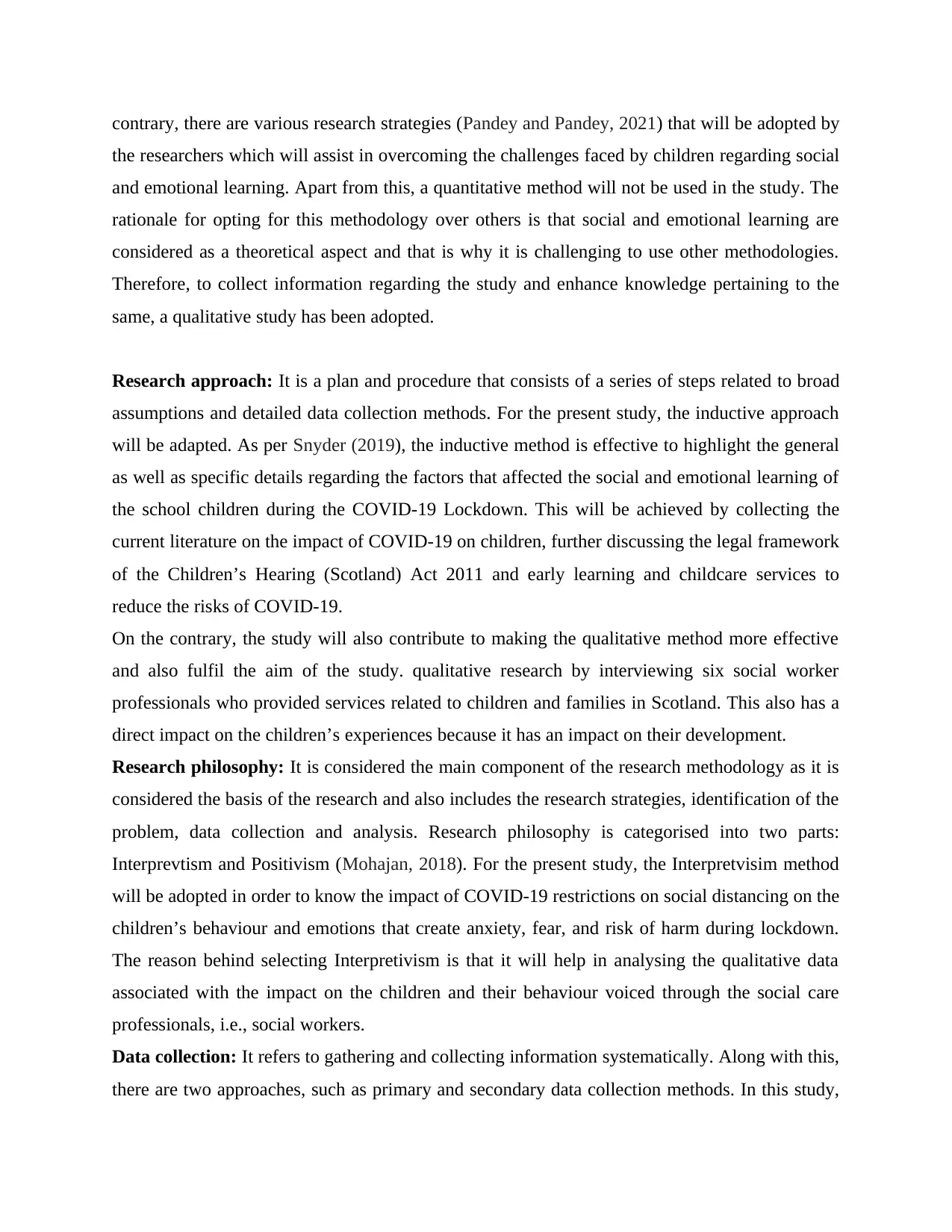
contrary, there are various research strategies (Pandey and Pandey, 2021) that will be adopted by
the researchers which will assist in overcoming the challenges faced by children regarding social
and emotional learning. Apart from this, a quantitative method will not be used in the study. The
rationale for opting for this methodology over others is that social and emotional learning are
considered as a theoretical aspect and that is why it is challenging to use other methodologies.
Therefore, to collect information regarding the study and enhance knowledge pertaining to the
same, a qualitative study has been adopted.
Research approach: It is a plan and procedure that consists of a series of steps related to broad
assumptions and detailed data collection methods. For the present study, the inductive approach
will be adapted. As per Snyder (2019), the inductive method is effective to highlight the general
as well as specific details regarding the factors that affected the social and emotional learning of
the school children during the COVID-19 Lockdown. This will be achieved by collecting the
current literature on the impact of COVID-19 on children, further discussing the legal framework
of the Children’s Hearing (Scotland) Act 2011 and early learning and childcare services to
reduce the risks of COVID-19.
On the contrary, the study will also contribute to making the qualitative method more effective
and also fulfil the aim of the study. qualitative research by interviewing six social worker
professionals who provided services related to children and families in Scotland. This also has a
direct impact on the children’s experiences because it has an impact on their development.
Research philosophy: It is considered the main component of the research methodology as it is
considered the basis of the research and also includes the research strategies, identification of the
problem, data collection and analysis. Research philosophy is categorised into two parts:
Interprevtism and Positivism (Mohajan, 2018). For the present study, the Interpretvisim method
will be adopted in order to know the impact of COVID-19 restrictions on social distancing on the
children’s behaviour and emotions that create anxiety, fear, and risk of harm during lockdown.
The reason behind selecting Interpretivism is that it will help in analysing the qualitative data
associated with the impact on the children and their behaviour voiced through the social care
professionals, i.e., social workers.
Data collection: It refers to gathering and collecting information systematically. Along with this,
there are two approaches, such as primary and secondary data collection methods. In this study,
the researchers which will assist in overcoming the challenges faced by children regarding social
and emotional learning. Apart from this, a quantitative method will not be used in the study. The
rationale for opting for this methodology over others is that social and emotional learning are
considered as a theoretical aspect and that is why it is challenging to use other methodologies.
Therefore, to collect information regarding the study and enhance knowledge pertaining to the
same, a qualitative study has been adopted.
Research approach: It is a plan and procedure that consists of a series of steps related to broad
assumptions and detailed data collection methods. For the present study, the inductive approach
will be adapted. As per Snyder (2019), the inductive method is effective to highlight the general
as well as specific details regarding the factors that affected the social and emotional learning of
the school children during the COVID-19 Lockdown. This will be achieved by collecting the
current literature on the impact of COVID-19 on children, further discussing the legal framework
of the Children’s Hearing (Scotland) Act 2011 and early learning and childcare services to
reduce the risks of COVID-19.
On the contrary, the study will also contribute to making the qualitative method more effective
and also fulfil the aim of the study. qualitative research by interviewing six social worker
professionals who provided services related to children and families in Scotland. This also has a
direct impact on the children’s experiences because it has an impact on their development.
Research philosophy: It is considered the main component of the research methodology as it is
considered the basis of the research and also includes the research strategies, identification of the
problem, data collection and analysis. Research philosophy is categorised into two parts:
Interprevtism and Positivism (Mohajan, 2018). For the present study, the Interpretvisim method
will be adopted in order to know the impact of COVID-19 restrictions on social distancing on the
children’s behaviour and emotions that create anxiety, fear, and risk of harm during lockdown.
The reason behind selecting Interpretivism is that it will help in analysing the qualitative data
associated with the impact on the children and their behaviour voiced through the social care
professionals, i.e., social workers.
Data collection: It refers to gathering and collecting information systematically. Along with this,
there are two approaches, such as primary and secondary data collection methods. In this study,
Paraphrase This Document
Need a fresh take? Get an instant paraphrase of this document with our AI Paraphraser
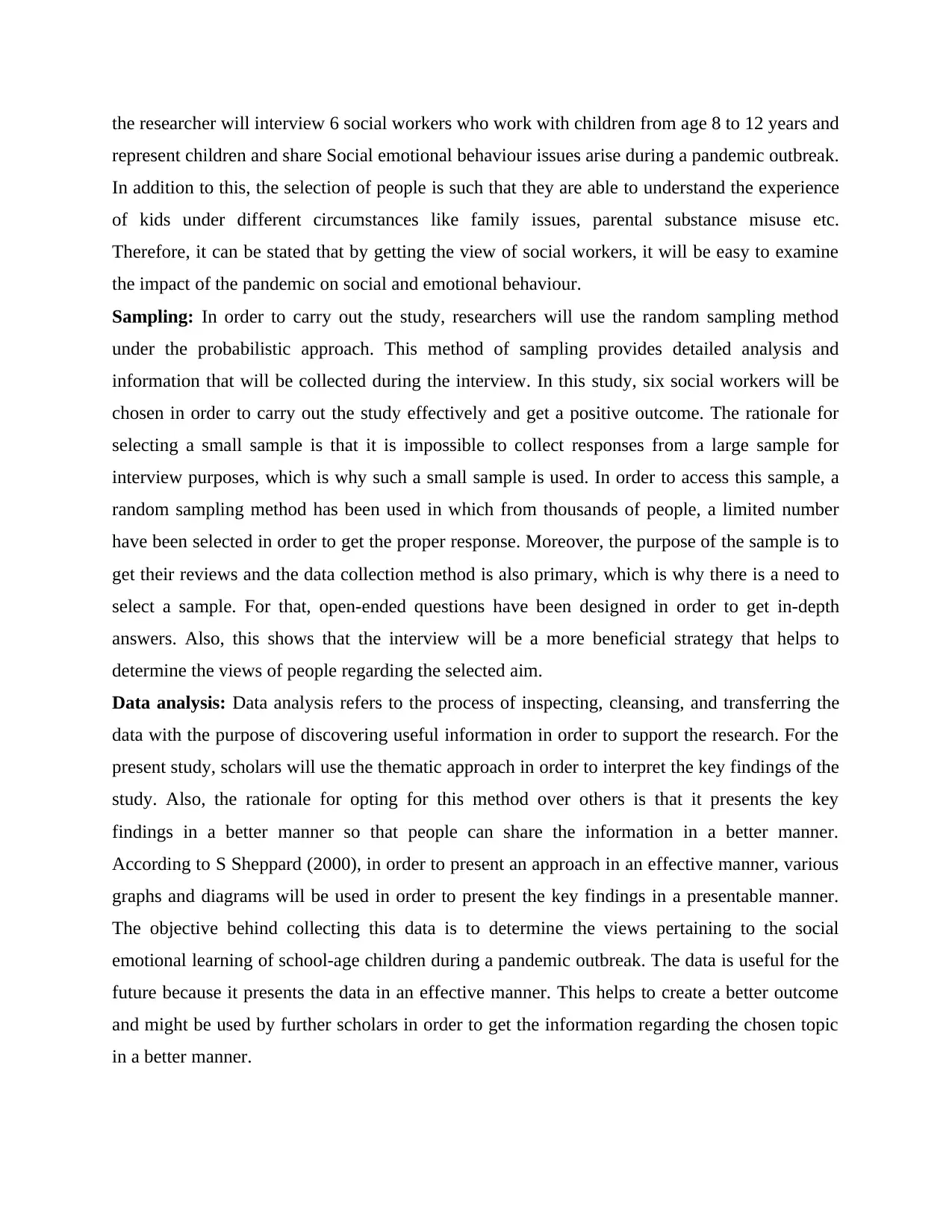
the researcher will interview 6 social workers who work with children from age 8 to 12 years and
represent children and share Social emotional behaviour issues arise during a pandemic outbreak.
In addition to this, the selection of people is such that they are able to understand the experience
of kids under different circumstances like family issues, parental substance misuse etc.
Therefore, it can be stated that by getting the view of social workers, it will be easy to examine
the impact of the pandemic on social and emotional behaviour.
Sampling: In order to carry out the study, researchers will use the random sampling method
under the probabilistic approach. This method of sampling provides detailed analysis and
information that will be collected during the interview. In this study, six social workers will be
chosen in order to carry out the study effectively and get a positive outcome. The rationale for
selecting a small sample is that it is impossible to collect responses from a large sample for
interview purposes, which is why such a small sample is used. In order to access this sample, a
random sampling method has been used in which from thousands of people, a limited number
have been selected in order to get the proper response. Moreover, the purpose of the sample is to
get their reviews and the data collection method is also primary, which is why there is a need to
select a sample. For that, open-ended questions have been designed in order to get in-depth
answers. Also, this shows that the interview will be a more beneficial strategy that helps to
determine the views of people regarding the selected aim.
Data analysis: Data analysis refers to the process of inspecting, cleansing, and transferring the
data with the purpose of discovering useful information in order to support the research. For the
present study, scholars will use the thematic approach in order to interpret the key findings of the
study. Also, the rationale for opting for this method over others is that it presents the key
findings in a better manner so that people can share the information in a better manner.
According to S Sheppard (2000), in order to present an approach in an effective manner, various
graphs and diagrams will be used in order to present the key findings in a presentable manner.
The objective behind collecting this data is to determine the views pertaining to the social
emotional learning of school-age children during a pandemic outbreak. The data is useful for the
future because it presents the data in an effective manner. This helps to create a better outcome
and might be used by further scholars in order to get the information regarding the chosen topic
in a better manner.
represent children and share Social emotional behaviour issues arise during a pandemic outbreak.
In addition to this, the selection of people is such that they are able to understand the experience
of kids under different circumstances like family issues, parental substance misuse etc.
Therefore, it can be stated that by getting the view of social workers, it will be easy to examine
the impact of the pandemic on social and emotional behaviour.
Sampling: In order to carry out the study, researchers will use the random sampling method
under the probabilistic approach. This method of sampling provides detailed analysis and
information that will be collected during the interview. In this study, six social workers will be
chosen in order to carry out the study effectively and get a positive outcome. The rationale for
selecting a small sample is that it is impossible to collect responses from a large sample for
interview purposes, which is why such a small sample is used. In order to access this sample, a
random sampling method has been used in which from thousands of people, a limited number
have been selected in order to get the proper response. Moreover, the purpose of the sample is to
get their reviews and the data collection method is also primary, which is why there is a need to
select a sample. For that, open-ended questions have been designed in order to get in-depth
answers. Also, this shows that the interview will be a more beneficial strategy that helps to
determine the views of people regarding the selected aim.
Data analysis: Data analysis refers to the process of inspecting, cleansing, and transferring the
data with the purpose of discovering useful information in order to support the research. For the
present study, scholars will use the thematic approach in order to interpret the key findings of the
study. Also, the rationale for opting for this method over others is that it presents the key
findings in a better manner so that people can share the information in a better manner.
According to S Sheppard (2000), in order to present an approach in an effective manner, various
graphs and diagrams will be used in order to present the key findings in a presentable manner.
The objective behind collecting this data is to determine the views pertaining to the social
emotional learning of school-age children during a pandemic outbreak. The data is useful for the
future because it presents the data in an effective manner. This helps to create a better outcome
and might be used by further scholars in order to get the information regarding the chosen topic
in a better manner.
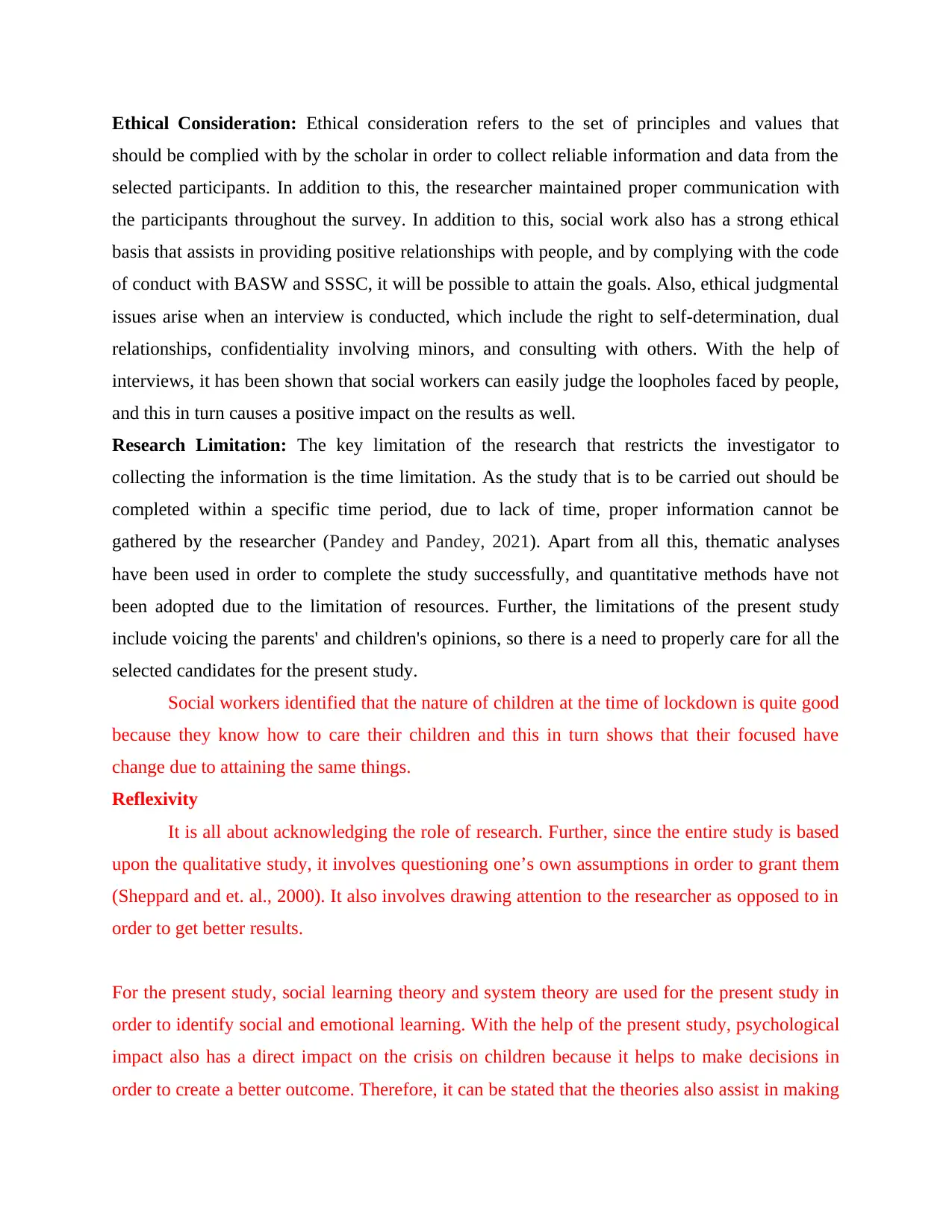
Ethical Consideration: Ethical consideration refers to the set of principles and values that
should be complied with by the scholar in order to collect reliable information and data from the
selected participants. In addition to this, the researcher maintained proper communication with
the participants throughout the survey. In addition to this, social work also has a strong ethical
basis that assists in providing positive relationships with people, and by complying with the code
of conduct with BASW and SSSC, it will be possible to attain the goals. Also, ethical judgmental
issues arise when an interview is conducted, which include the right to self-determination, dual
relationships, confidentiality involving minors, and consulting with others. With the help of
interviews, it has been shown that social workers can easily judge the loopholes faced by people,
and this in turn causes a positive impact on the results as well.
Research Limitation: The key limitation of the research that restricts the investigator to
collecting the information is the time limitation. As the study that is to be carried out should be
completed within a specific time period, due to lack of time, proper information cannot be
gathered by the researcher (Pandey and Pandey, 2021). Apart from all this, thematic analyses
have been used in order to complete the study successfully, and quantitative methods have not
been adopted due to the limitation of resources. Further, the limitations of the present study
include voicing the parents' and children's opinions, so there is a need to properly care for all the
selected candidates for the present study.
Social workers identified that the nature of children at the time of lockdown is quite good
because they know how to care their children and this in turn shows that their focused have
change due to attaining the same things.
Reflexivity
It is all about acknowledging the role of research. Further, since the entire study is based
upon the qualitative study, it involves questioning one’s own assumptions in order to grant them
(Sheppard and et. al., 2000). It also involves drawing attention to the researcher as opposed to in
order to get better results.
For the present study, social learning theory and system theory are used for the present study in
order to identify social and emotional learning. With the help of the present study, psychological
impact also has a direct impact on the crisis on children because it helps to make decisions in
order to create a better outcome. Therefore, it can be stated that the theories also assist in making
should be complied with by the scholar in order to collect reliable information and data from the
selected participants. In addition to this, the researcher maintained proper communication with
the participants throughout the survey. In addition to this, social work also has a strong ethical
basis that assists in providing positive relationships with people, and by complying with the code
of conduct with BASW and SSSC, it will be possible to attain the goals. Also, ethical judgmental
issues arise when an interview is conducted, which include the right to self-determination, dual
relationships, confidentiality involving minors, and consulting with others. With the help of
interviews, it has been shown that social workers can easily judge the loopholes faced by people,
and this in turn causes a positive impact on the results as well.
Research Limitation: The key limitation of the research that restricts the investigator to
collecting the information is the time limitation. As the study that is to be carried out should be
completed within a specific time period, due to lack of time, proper information cannot be
gathered by the researcher (Pandey and Pandey, 2021). Apart from all this, thematic analyses
have been used in order to complete the study successfully, and quantitative methods have not
been adopted due to the limitation of resources. Further, the limitations of the present study
include voicing the parents' and children's opinions, so there is a need to properly care for all the
selected candidates for the present study.
Social workers identified that the nature of children at the time of lockdown is quite good
because they know how to care their children and this in turn shows that their focused have
change due to attaining the same things.
Reflexivity
It is all about acknowledging the role of research. Further, since the entire study is based
upon the qualitative study, it involves questioning one’s own assumptions in order to grant them
(Sheppard and et. al., 2000). It also involves drawing attention to the researcher as opposed to in
order to get better results.
For the present study, social learning theory and system theory are used for the present study in
order to identify social and emotional learning. With the help of the present study, psychological
impact also has a direct impact on the crisis on children because it helps to make decisions in
order to create a better outcome. Therefore, it can be stated that the theories also assist in making
⊘ This is a preview!⊘
Do you want full access?
Subscribe today to unlock all pages.

Trusted by 1+ million students worldwide
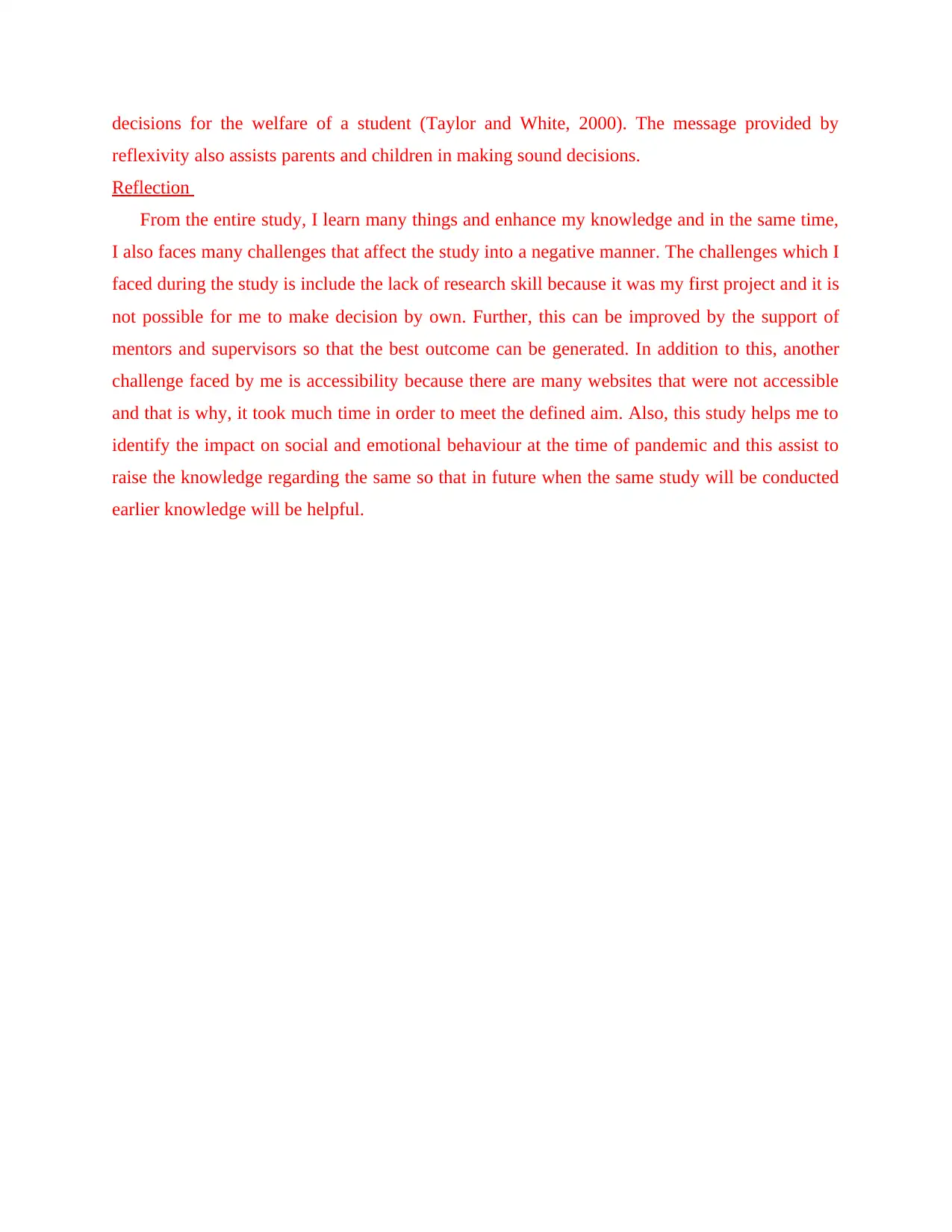
decisions for the welfare of a student (Taylor and White, 2000). The message provided by
reflexivity also assists parents and children in making sound decisions.
Reflection
From the entire study, I learn many things and enhance my knowledge and in the same time,
I also faces many challenges that affect the study into a negative manner. The challenges which I
faced during the study is include the lack of research skill because it was my first project and it is
not possible for me to make decision by own. Further, this can be improved by the support of
mentors and supervisors so that the best outcome can be generated. In addition to this, another
challenge faced by me is accessibility because there are many websites that were not accessible
and that is why, it took much time in order to meet the defined aim. Also, this study helps me to
identify the impact on social and emotional behaviour at the time of pandemic and this assist to
raise the knowledge regarding the same so that in future when the same study will be conducted
earlier knowledge will be helpful.
reflexivity also assists parents and children in making sound decisions.
Reflection
From the entire study, I learn many things and enhance my knowledge and in the same time,
I also faces many challenges that affect the study into a negative manner. The challenges which I
faced during the study is include the lack of research skill because it was my first project and it is
not possible for me to make decision by own. Further, this can be improved by the support of
mentors and supervisors so that the best outcome can be generated. In addition to this, another
challenge faced by me is accessibility because there are many websites that were not accessible
and that is why, it took much time in order to meet the defined aim. Also, this study helps me to
identify the impact on social and emotional behaviour at the time of pandemic and this assist to
raise the knowledge regarding the same so that in future when the same study will be conducted
earlier knowledge will be helpful.
Paraphrase This Document
Need a fresh take? Get an instant paraphrase of this document with our AI Paraphraser
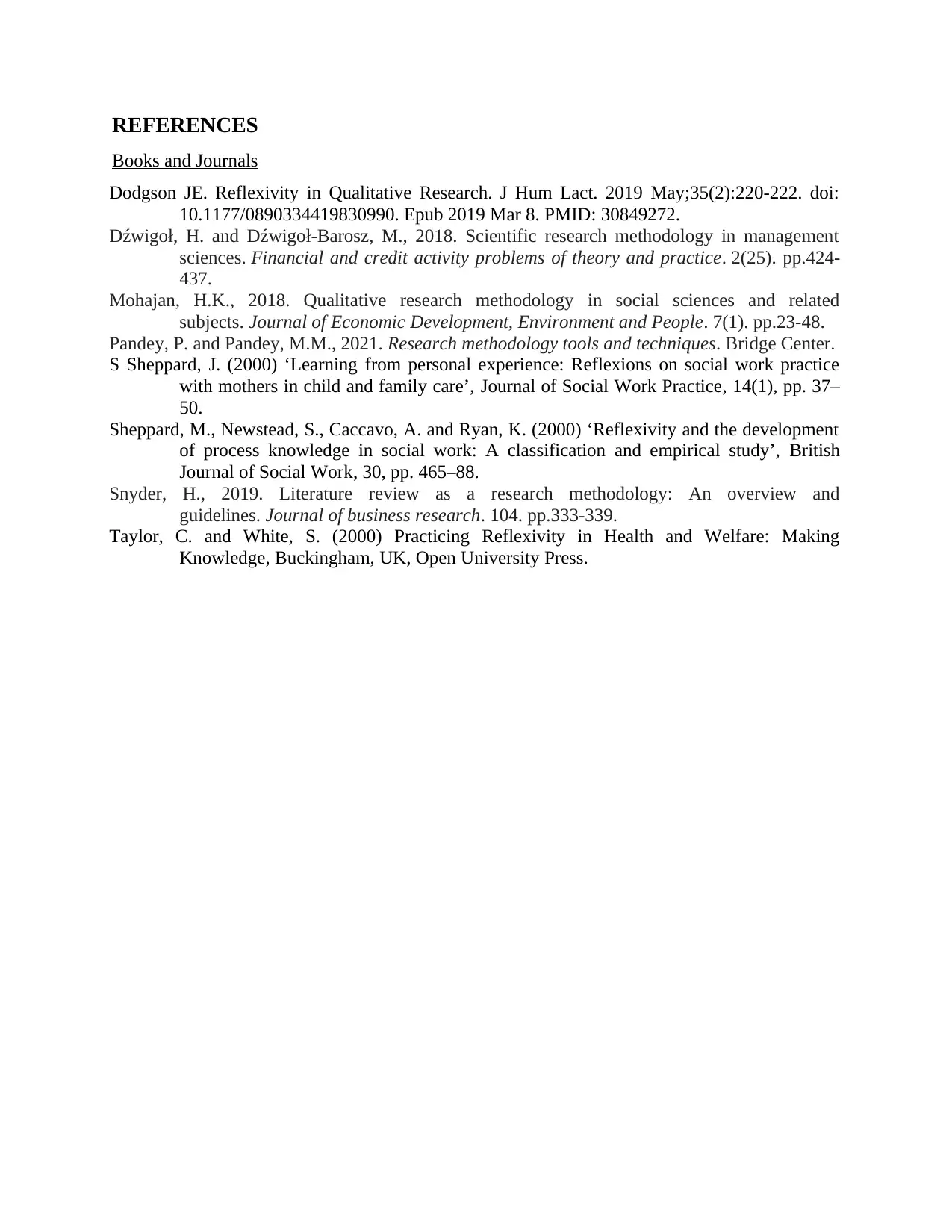
REFERENCES
Books and Journals
Dodgson JE. Reflexivity in Qualitative Research. J Hum Lact. 2019 May;35(2):220-222. doi:
10.1177/0890334419830990. Epub 2019 Mar 8. PMID: 30849272.
Dźwigoł, H. and Dźwigoł-Barosz, M., 2018. Scientific research methodology in management
sciences. Financial and credit activity problems of theory and practice. 2(25). pp.424-
437.
Mohajan, H.K., 2018. Qualitative research methodology in social sciences and related
subjects. Journal of Economic Development, Environment and People. 7(1). pp.23-48.
Pandey, P. and Pandey, M.M., 2021. Research methodology tools and techniques. Bridge Center.
S Sheppard, J. (2000) ‘Learning from personal experience: Reflexions on social work practice
with mothers in child and family care’, Journal of Social Work Practice, 14(1), pp. 37–
50.
Sheppard, M., Newstead, S., Caccavo, A. and Ryan, K. (2000) ‘Reflexivity and the development
of process knowledge in social work: A classification and empirical study’, British
Journal of Social Work, 30, pp. 465–88.
Snyder, H., 2019. Literature review as a research methodology: An overview and
guidelines. Journal of business research. 104. pp.333-339.
Taylor, C. and White, S. (2000) Practicing Reflexivity in Health and Welfare: Making
Knowledge, Buckingham, UK, Open University Press.
Books and Journals
Dodgson JE. Reflexivity in Qualitative Research. J Hum Lact. 2019 May;35(2):220-222. doi:
10.1177/0890334419830990. Epub 2019 Mar 8. PMID: 30849272.
Dźwigoł, H. and Dźwigoł-Barosz, M., 2018. Scientific research methodology in management
sciences. Financial and credit activity problems of theory and practice. 2(25). pp.424-
437.
Mohajan, H.K., 2018. Qualitative research methodology in social sciences and related
subjects. Journal of Economic Development, Environment and People. 7(1). pp.23-48.
Pandey, P. and Pandey, M.M., 2021. Research methodology tools and techniques. Bridge Center.
S Sheppard, J. (2000) ‘Learning from personal experience: Reflexions on social work practice
with mothers in child and family care’, Journal of Social Work Practice, 14(1), pp. 37–
50.
Sheppard, M., Newstead, S., Caccavo, A. and Ryan, K. (2000) ‘Reflexivity and the development
of process knowledge in social work: A classification and empirical study’, British
Journal of Social Work, 30, pp. 465–88.
Snyder, H., 2019. Literature review as a research methodology: An overview and
guidelines. Journal of business research. 104. pp.333-339.
Taylor, C. and White, S. (2000) Practicing Reflexivity in Health and Welfare: Making
Knowledge, Buckingham, UK, Open University Press.
1 out of 8
Related Documents
Your All-in-One AI-Powered Toolkit for Academic Success.
+13062052269
info@desklib.com
Available 24*7 on WhatsApp / Email
![[object Object]](/_next/static/media/star-bottom.7253800d.svg)
Unlock your academic potential
Copyright © 2020–2025 A2Z Services. All Rights Reserved. Developed and managed by ZUCOL.





